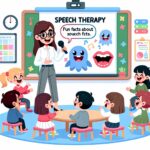In this article, we delve into the world of diagnosing and treating speech disorders, a topic that is both crucial and fascinating in the realm of communication sciences. As we explore effective approaches for identifying and addressing these disorders, we are guided by the expertise of a seasoned speech-language pathologist with years of experience in the field. With a wealth of knowledge and a passion for helping individuals improve their communication skills, this article provides expert insights and practical guidance to unravel the complexities of diagnosing and treating speech disorders.

Diagnosing and Treating Speech Disorders: Expert Insights
As an experienced speech-language pathologist with expertise in diagnosing and treating various speech disorders, I have witnessed the profound impact that effective intervention can have on individuals’ communication skills. In this article, I will provide valuable insights and practical guidance on diagnosing and treating speech disorders, drawing from my extensive experience, continuous professional development, and passion for helping individuals improve their communication abilities.
How are Speech Disorders Diagnosed?
The process of diagnosing speech disorders begins with an evaluation of the individual’s symptoms by a speech-language pathologist (SLP). This evaluation often involves the use of specific tools and assessments, such as the Denver Articulation Screening Examination, Leiter International Performance scale-3, Goldman-Fristoe Test of Articulation 3 (GFTA-3), Arizona Articulation and Phonology Scale 4th Revision (Arizona-4), and Prosody-voice screening profile. These tests help identify the specific areas of difficulty and determine the severity of the disorder.
To ensure a comprehensive understanding of the individual’s abilities and challenges, healthcare providers typically initiate the diagnosis with a developmental evaluation. This evaluation helps establish a baseline and provides valuable insights into the individual’s overall development, which can be crucial in identifying any underlying causes or contributing factors to their speech disorder.
Key Point: Diagnosis of speech disorders involves evaluating symptoms and conducting comprehensive developmental and specific assessments to identify difficulties and determine the severity of the disorder.
Legal Definitions and Early Intervention
It’s important to note that speech and language disorders are legally defined disabilities. This means that individuals, particularly children, may be eligible to receive testing and treatment through their state’s early intervention program or local public schools. Early intervention is critical for maximizing the effectiveness of treatment and supporting the development of a child’s communication skills from an early age.
The availability of early intervention services reaffirms the significance of timely and accurate diagnosis. By identifying speech disorders early on, professionals can create tailored therapy plans that address the specific needs of the individual, increasing the likelihood of positive treatment outcomes.
Key Point: Speech disorders are defined as disabilities, and children may receive testing and treatment through early intervention programs or public schools. Early identification is crucial for effective treatment planning.
Effective Approaches in Treating Speech Disorders
Treatment for speech disorders can vary depending on the type and severity of the condition. The main aim of therapy is to improve the individual’s communication skills, promoting functional and meaningful interactions. Through my extensive experience, I have observed that a multidimensional and individualized approach yields the best results.
Speech therapy is a commonly employed treatment method for speech disorders. This form of therapy involves engaging in activities and exercises that target specific areas of difficulty, such as articulation, phonological errors, apraxia, fluency, and voice disorders. The therapy sessions are tailored to the individual’s needs, utilizing evidence-based techniques to enhance speech production, language comprehension, and overall communication abilities.
Key Point: Speech therapy, customized to the individual’s specific needs, plays a vital role in treating speech disorders and improving communication skills.
In some cases, speech disorders may improve or resolve on their own, especially in young children. However, it is important for individuals to seek professional help if the speech disorder persists or interferes with daily activities, social interactions, or academic performance.
Pros and Cons of Different Treatment Approaches
Just like any form of treatment, there are pros and cons associated with various approaches in diagnosing and treating speech disorders. Let’s explore some of the key considerations:
Pros of Speech Therapy:
- Tailored to an individual’s specific needs
- Evidence-based techniques
- Improves speech production and overall communication skills
- Enhances language comprehension
Cons of Speech Therapy:
- Requires consistent attendance and participation
- May be time-intensive depending on the severity of the disorder
- May require ongoing therapy for optimal outcomes
Key Point: Speech therapy offers tailored and evidence-based treatment approaches that can significantly improve speech production and communication skills. However, it requires consistent attendance and may be time-intensive for optimal outcomes.
Conclusion
Effective approaches for diagnosing and treating speech disorders involve a multidimensional and individualized approach, utilizing specialized assessments and therapies. Early identification of speech disorders is crucial, as it enables timely interventions and increases the likelihood of positive treatment outcomes. Through speech therapy and other appropriate interventions, individuals can enhance their communication skills and regain confidence in expressing themselves effectively.
Remember, if you or someone you know is experiencing difficulties with speech, seeking the expertise of a speech-language pathologist can make a significant difference. With professional guidance, individuals can navigate their speech disorders, unlocking their full potential in communication and beyond.
“By utilizing evidence-based techniques and individualized therapy plans, speech-language pathologists empower individuals to overcome speech disorders, enabling them to communicate confidently and effectively.”
A speech pathologist is a professional who plays a crucial role in helping individuals improve their communication abilities. Whether you struggle with articulation, language development, or voice disorders, a skilled speech pathologist can provide the support and guidance you need. If you’re looking for a reliable and experienced speech pathologist, look no further than our team at Speech Pathologist. With a comprehensive range of services and a commitment to personalized care, we strive to empower our clients to overcome their communication challenges and thrive. Don’t let communication difficulties hold you back – click here to discover the difference a speech pathologist can make in your life.
FAQ
Question 1: What is the process for diagnosing speech disorders?
Answer 1: Speech disorders are diagnosed by speech-language pathologists (SLPs) through an evaluation of symptoms. Evaluation tools commonly used for diagnosing speech disorders include the Denver Articulation Screening Examination, Leiter International Performance scale-3, Goldman-Fristoe Test of Articulation 3 (GFTA-3), Arizona Articulation and Phonology Scale 4th Revision (Arizona-4), and Prosody-voice screening profile. Healthcare providers typically start the diagnosis with a comprehensive developmental evaluation.
Question 2: Are speech and language disorders considered disabilities?
Answer 2: Yes, speech and language disorders are legally defined disabilities. Children with speech disorders may receive testing and treatment through their state’s early intervention program or local public schools.
Question 3: What types of speech disorders can be treated through speech therapy?
Answer 3: Speech therapy can be effective in treating a wide range of speech disorders. Some common speech disorders that can be addressed through therapy include articulation and phonological disorders, apraxia, fluency disorders, and voice disorders.
Question 4: Can speech disorders improve or go away on their own?
Answer 4: The prognosis for speech disorders varies. Some speech disorders may improve or even resolve on their own over time, while others may require ongoing treatment. It is important to consult with a speech-language pathologist for an accurate assessment and appropriate treatment plan.
Question 5: How can interdisciplinary collaboration help in treating speech disorders?
Answer 5: Interdisciplinary collaboration is beneficial in treating speech disorders. Speech-language pathologists often work in collaboration with other professionals, such as occupational therapists, psychologists, and educators, to ensure comprehensive care and the best possible outcomes for individuals with speech disorders. By combining expertise from different fields, an interdisciplinary team can provide holistic and tailored treatment approaches.
















